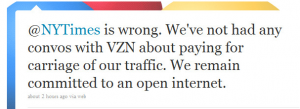There is clearly a new and old school culture clash brewing in the world of business. The clash being between the formal and the informal.
Check out this example between how Verizon and Google responded to a NY Times article suggestion the two companies were talking to end net neutrality.
Verizon’s response on their Public Policy Blog:
The NYT article regarding conversations between Google and Verizon is mistaken. It fundamentally misunderstands our purpose. As we said in our earlier FCC filing, our goal is an Internet policy framework that ensures openness and accountability, and incorporates specific FCC authority, while maintaining investment and innovation. To suggest this is a business arrangement between our companies is entirely incorrect.
Google’s response on Twitter:
@NYTimes is wrong. We’ve not had any convos with VZN about paying for carriage of our traffic. We remain committed to an open Internet.
Verizon’s response is more of the same old, white washed, formal, makes sure it ruffles no feathers and offends no one. Verizon says “mistaken” as opposed to Google who says NY Times is “wrong.” Google used a tweet, said what they felt, used abbreviations and made it conversational. Verizon was anything but. It feels as if 10 different people approved it, before it was sent out. The statement was structured, formal and stiff.
I think we are seeing a shift in the role of formality in business; in everything from dress, to communication, to hierarchy. The old schools is holding on to formality as a course of doing business. The new school is doing away with it in order to reduce friction and accelerate progress.
If this communication were to be measured, how much do you think each of these cost in time, person effort, and money? I suspect Verizon’s cost 25 times more than Googles. Why?
What do you think? Are you old school or new school?



